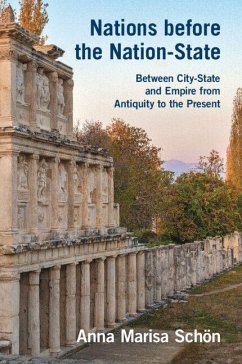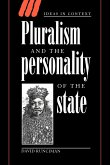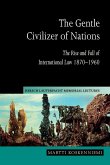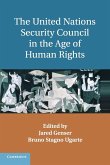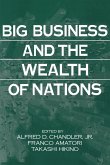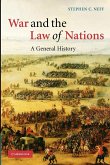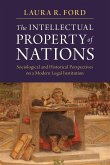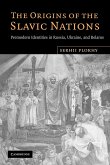Anna Marisa Schon (North Carolina Duke University)
Nations before the Nation-State
Anna Marisa Schon (North Carolina Duke University)
Nations before the Nation-State
- Broschiertes Buch
- Merkliste
- Auf die Merkliste
- Bewerten Bewerten
- Teilen
- Produkt teilen
- Produkterinnerung
- Produkterinnerung
The first extended study of nationhood in ancient and medieval political thought, this book recovers a distinctly pre-modern conception of the nation as a cultural and linguistic, yet not political community, and brings historic insights to bear on contemporary political issues such as national pluralism and the resurgence of nationalism.
Andere Kunden interessierten sich auch für
![Pluralism and the Personality of the State Pluralism and the Personality of the State]() David Runciman (University of Cambridge)Pluralism and the Personality of the State38,99 €
David Runciman (University of Cambridge)Pluralism and the Personality of the State38,99 €![The Gentle Civilizer of Nations The Gentle Civilizer of Nations]() Martti Koskenniemi (University of Helsinki)The Gentle Civilizer of Nations107,99 €
Martti Koskenniemi (University of Helsinki)The Gentle Civilizer of Nations107,99 €![The United Nations Security Council in the Age of Human Rights The United Nations Security Council in the Age of Human Rights]() The United Nations Security Council in the Age of Human Rights49,99 €
The United Nations Security Council in the Age of Human Rights49,99 €![Big Business and the Wealth of Nations Big Business and the Wealth of Nations]() D. Chandler / Franco Amatori / Takashi Hikino (eds.)Big Business and the Wealth of Nations74,99 €
D. Chandler / Franco Amatori / Takashi Hikino (eds.)Big Business and the Wealth of Nations74,99 €![War and the Law of Nations War and the Law of Nations]() Stephen C. Neff (University of Edinburgh)War and the Law of Nations66,99 €
Stephen C. Neff (University of Edinburgh)War and the Law of Nations66,99 €![The Intellectual Property of Nations The Intellectual Property of Nations]() Laura R. Ford (New York Bard College)The Intellectual Property of Nations44,99 €
Laura R. Ford (New York Bard College)The Intellectual Property of Nations44,99 €![The Origins of the Slavic Nations The Origins of the Slavic Nations]() Serhii Plokhy (University of Alberta)The Origins of the Slavic Nations39,99 €
Serhii Plokhy (University of Alberta)The Origins of the Slavic Nations39,99 €-
-
-
The first extended study of nationhood in ancient and medieval political thought, this book recovers a distinctly pre-modern conception of the nation as a cultural and linguistic, yet not political community, and brings historic insights to bear on contemporary political issues such as national pluralism and the resurgence of nationalism.
Hinweis: Dieser Artikel kann nur an eine deutsche Lieferadresse ausgeliefert werden.
Hinweis: Dieser Artikel kann nur an eine deutsche Lieferadresse ausgeliefert werden.
Produktdetails
- Produktdetails
- Verlag: Cambridge University Press
- Seitenzahl: 232
- Erscheinungstermin: 21. Oktober 2024
- Englisch
- Abmessung: 229mm x 152mm x 14mm
- Gewicht: 352g
- ISBN-13: 9781009441254
- ISBN-10: 1009441256
- Artikelnr.: 69947669
- Herstellerkennzeichnung
- Books on Demand GmbH
- In de Tarpen 42
- 22848 Norderstedt
- info@bod.de
- 040 53433511
- Verlag: Cambridge University Press
- Seitenzahl: 232
- Erscheinungstermin: 21. Oktober 2024
- Englisch
- Abmessung: 229mm x 152mm x 14mm
- Gewicht: 352g
- ISBN-13: 9781009441254
- ISBN-10: 1009441256
- Artikelnr.: 69947669
- Herstellerkennzeichnung
- Books on Demand GmbH
- In de Tarpen 42
- 22848 Norderstedt
- info@bod.de
- 040 53433511
Anna Marisa Schön is a Postdoctoral Associate at the Department of Political Science at Duke University. Her research focuses on medieval political thought, and questions surrounding nationalism, national pluralism, and empire. She has co-translated J. G. Fichte's work on the French Revolution (2021) and her work has appeared in History of Political Thought, British Journal of the History of Philosophy, and Democratic Theory.
Part I. Introduction: A Plan for Rethinking the Nation: 1. The nation-state paradigm
2. A project of conceptual recovery
3. Political imagination
4. Liberal multiculturalism and constitutional patriotism
5. Selection of sources and overview of the book
6. Some preliminary conclusions
Part II. What Is a Nation? A Brief Historiography of Theories of the Nation: 1. Romantic beginnings
2. Classical modernism and the state
3. The modernist bogeyman
4. Ethno-symbolism and its critics
5. Getting our history less wrong
Part III. A Tale of Two Fatherlands: Ancient Conceptions of Nationhood: 1. Ancient sources of Hellenicity
2. Greek patriotism
3. The bonds of humanity
4. Roman citizenship and legal pluralism
5. Nations in the vulgate
6. Religion, Law, and Peoplehood in Biblical Judaea
Part IV. Post-Roman Transitions: National Identity in the Wake of the Empire: 1. Cassiodorus' imperial propaganda
2. Ethnonyms and etymologies
3. Isidore's appropriation of empire
4. Historiography as political theory
Part V. Medieval Imperialism: National Diversity and Universal Order: 1. World government and its alternatives
2. Dante imagines the nation
3. Humanity's intellectual unity
4. Difference as punishment, difference as pleasure
5. Consent as the foundation of empire
Part VI. Nationality and the Medieval 'State' in France: 1. Medieval international relations
2. Dubois' multinational vision for the holy land
3. A pre-national defense of political particularism
4. Participatory citizenship in the footsteps of marsiglio of Padua
5. Love for king and country
Part VII. The Nation at a Crossroads: 1. Absolute and limited government in the thought of John Fortescue
2. Royal absolutism and the pursuit of uniformity
3. Nationalizing the state, politicizing the nation
4. One king, one law, one nation
5. The myth of antiquity
6. English exceptionalism revisited
Part VIII. Conclusions: Rekindling Ancient and Medieval Concepts: 1. Lessons from imperialism
2. The opening and closure of political life
3. We are bundles of hyphens
4. New quests for solidarity
Bibliography.
2. A project of conceptual recovery
3. Political imagination
4. Liberal multiculturalism and constitutional patriotism
5. Selection of sources and overview of the book
6. Some preliminary conclusions
Part II. What Is a Nation? A Brief Historiography of Theories of the Nation: 1. Romantic beginnings
2. Classical modernism and the state
3. The modernist bogeyman
4. Ethno-symbolism and its critics
5. Getting our history less wrong
Part III. A Tale of Two Fatherlands: Ancient Conceptions of Nationhood: 1. Ancient sources of Hellenicity
2. Greek patriotism
3. The bonds of humanity
4. Roman citizenship and legal pluralism
5. Nations in the vulgate
6. Religion, Law, and Peoplehood in Biblical Judaea
Part IV. Post-Roman Transitions: National Identity in the Wake of the Empire: 1. Cassiodorus' imperial propaganda
2. Ethnonyms and etymologies
3. Isidore's appropriation of empire
4. Historiography as political theory
Part V. Medieval Imperialism: National Diversity and Universal Order: 1. World government and its alternatives
2. Dante imagines the nation
3. Humanity's intellectual unity
4. Difference as punishment, difference as pleasure
5. Consent as the foundation of empire
Part VI. Nationality and the Medieval 'State' in France: 1. Medieval international relations
2. Dubois' multinational vision for the holy land
3. A pre-national defense of political particularism
4. Participatory citizenship in the footsteps of marsiglio of Padua
5. Love for king and country
Part VII. The Nation at a Crossroads: 1. Absolute and limited government in the thought of John Fortescue
2. Royal absolutism and the pursuit of uniformity
3. Nationalizing the state, politicizing the nation
4. One king, one law, one nation
5. The myth of antiquity
6. English exceptionalism revisited
Part VIII. Conclusions: Rekindling Ancient and Medieval Concepts: 1. Lessons from imperialism
2. The opening and closure of political life
3. We are bundles of hyphens
4. New quests for solidarity
Bibliography.
Part I. Introduction: A Plan for Rethinking the Nation: 1. The nation-state paradigm
2. A project of conceptual recovery
3. Political imagination
4. Liberal multiculturalism and constitutional patriotism
5. Selection of sources and overview of the book
6. Some preliminary conclusions
Part II. What Is a Nation? A Brief Historiography of Theories of the Nation: 1. Romantic beginnings
2. Classical modernism and the state
3. The modernist bogeyman
4. Ethno-symbolism and its critics
5. Getting our history less wrong
Part III. A Tale of Two Fatherlands: Ancient Conceptions of Nationhood: 1. Ancient sources of Hellenicity
2. Greek patriotism
3. The bonds of humanity
4. Roman citizenship and legal pluralism
5. Nations in the vulgate
6. Religion, Law, and Peoplehood in Biblical Judaea
Part IV. Post-Roman Transitions: National Identity in the Wake of the Empire: 1. Cassiodorus' imperial propaganda
2. Ethnonyms and etymologies
3. Isidore's appropriation of empire
4. Historiography as political theory
Part V. Medieval Imperialism: National Diversity and Universal Order: 1. World government and its alternatives
2. Dante imagines the nation
3. Humanity's intellectual unity
4. Difference as punishment, difference as pleasure
5. Consent as the foundation of empire
Part VI. Nationality and the Medieval 'State' in France: 1. Medieval international relations
2. Dubois' multinational vision for the holy land
3. A pre-national defense of political particularism
4. Participatory citizenship in the footsteps of marsiglio of Padua
5. Love for king and country
Part VII. The Nation at a Crossroads: 1. Absolute and limited government in the thought of John Fortescue
2. Royal absolutism and the pursuit of uniformity
3. Nationalizing the state, politicizing the nation
4. One king, one law, one nation
5. The myth of antiquity
6. English exceptionalism revisited
Part VIII. Conclusions: Rekindling Ancient and Medieval Concepts: 1. Lessons from imperialism
2. The opening and closure of political life
3. We are bundles of hyphens
4. New quests for solidarity
Bibliography.
2. A project of conceptual recovery
3. Political imagination
4. Liberal multiculturalism and constitutional patriotism
5. Selection of sources and overview of the book
6. Some preliminary conclusions
Part II. What Is a Nation? A Brief Historiography of Theories of the Nation: 1. Romantic beginnings
2. Classical modernism and the state
3. The modernist bogeyman
4. Ethno-symbolism and its critics
5. Getting our history less wrong
Part III. A Tale of Two Fatherlands: Ancient Conceptions of Nationhood: 1. Ancient sources of Hellenicity
2. Greek patriotism
3. The bonds of humanity
4. Roman citizenship and legal pluralism
5. Nations in the vulgate
6. Religion, Law, and Peoplehood in Biblical Judaea
Part IV. Post-Roman Transitions: National Identity in the Wake of the Empire: 1. Cassiodorus' imperial propaganda
2. Ethnonyms and etymologies
3. Isidore's appropriation of empire
4. Historiography as political theory
Part V. Medieval Imperialism: National Diversity and Universal Order: 1. World government and its alternatives
2. Dante imagines the nation
3. Humanity's intellectual unity
4. Difference as punishment, difference as pleasure
5. Consent as the foundation of empire
Part VI. Nationality and the Medieval 'State' in France: 1. Medieval international relations
2. Dubois' multinational vision for the holy land
3. A pre-national defense of political particularism
4. Participatory citizenship in the footsteps of marsiglio of Padua
5. Love for king and country
Part VII. The Nation at a Crossroads: 1. Absolute and limited government in the thought of John Fortescue
2. Royal absolutism and the pursuit of uniformity
3. Nationalizing the state, politicizing the nation
4. One king, one law, one nation
5. The myth of antiquity
6. English exceptionalism revisited
Part VIII. Conclusions: Rekindling Ancient and Medieval Concepts: 1. Lessons from imperialism
2. The opening and closure of political life
3. We are bundles of hyphens
4. New quests for solidarity
Bibliography.

